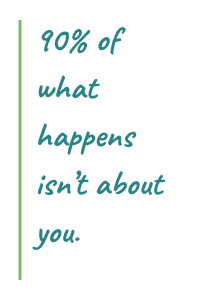Are You Taking Your Colleagues Personally?
In leadership development, navigating interpersonal dynamics plays a key role. Today, I am going to give you an important piece of advice:
Stop taking your colleagues personally.
So much of the angst I see in my leadership coaching clients is because they are taking the actions of their colleagues personally.
Taking your colleagues “personally” means you are interpreting their actions to mean something about you.
A beloved mentor of mine, Pittman McGehee, says: 90% of what happens isn't about you. (And even if it IS about you, aren't you better off still not taking it personally?)
For example, your colleague writes you a rude email. You're upset because they shouldn't speak to you that way.
>> Is the email actually rude, or is it simply brief and to the point because they're juggling a lot? Or are you receiving it from a place of stress or anxiety, thus hearing it in a skewed way?
Another colleague dismisses a comment you wrote in a shared Google Doc without a response. Why don't they care what you have to say?
>> Is it really true that they don't care what you have to say, or are they cleaning up the document and didn't realize the comment warranted a response?
Or what about the colleague who questions your decisions and criticizes the project you are working on?
>> This could be part of their paradigm, and actually one of their gifts. Could they work on being more appreciative as well? Sure. Is their perspective valuable, if you can lower your defenses? I'm going to say yes.
Reframing the situation doesn't mean you lower your respect level, become less open to their perspectives, or willingness to lean into the relationship and collaborate more. It just means you don't take their quirks, their oversights, their humanness personally.
So if you don't take these actions personally, what do you do with them? We've talked before about what to do about other people (spoiler alert: they're black boxes!) but this part may be new to you.
Be radically constructive.
How? You actually defend them, in your mind. You create a rationale that is the opposite of taking it personally. The explanation may be very boring and mild, executed with a bit of a shrug.
"It's late, I bet they're tired and have a lot going on."
"I may not be their favorite person, but I bet they too want us to be productive colleagues."
"They don't realize that what they're saying is confusing and unclear to me."
We all know how to do this because we do it with people we like and trust. I'm asking you to do it with the people who can sometimes feel like your enemies. Be radically constructive in the relationship.
I want to be clear. This doesn't mean you give up your power in the relationship in any way.
You can still ask for what you need.
You can still give feedback and ask them to stop a behavior that is not working for you.
You can still call out workplace behavior that should not be tolerated.
You'll actually be more effective at all of the above if you're not taking their actions to mean something about you. You'll be unattached and clear. You’ll have more inner peace and your mental energy will go toward the ways you’re meant to make the world a better place.


